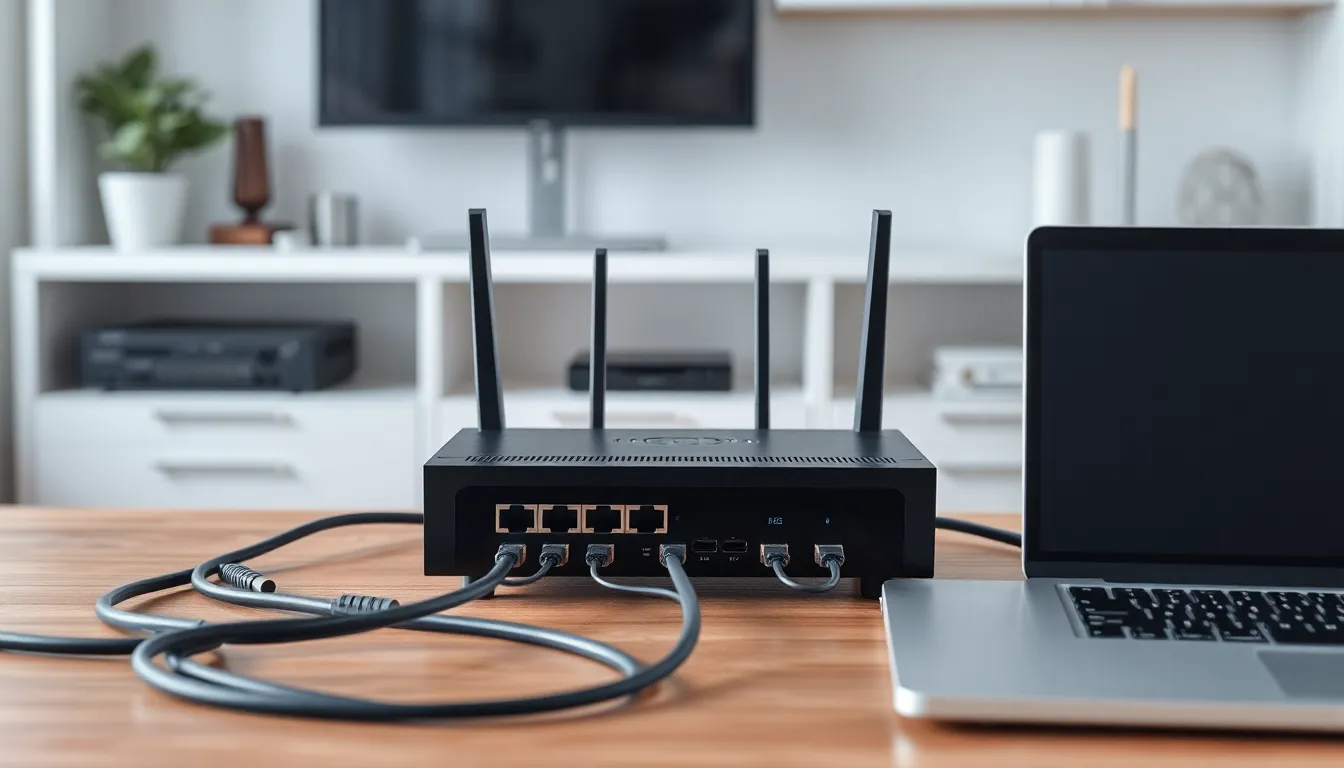In the vast world of IP addresses, 172.16.252.214.4300 stands out like a unicorn at a horse convention. This quirky combination of numbers might seem like a random jumble, but it holds secrets that could unlock the door to your network’s potential. Ever wondered what goes on behind the scenes of your digital realm? This address could be the key to understanding your network’s inner workings and performance.
Table of Contents
ToggleOverview of 172.16.252.214.4300
The IP address 172.16.252.214.4300 represents a unique combination often seen in specialized networks. This address falls into the private IP range, typically utilized within local area networks.
Port number 4300 indicates a specific application or service running on the network environment. Such port-specific assignments allow for streamlined communication between devices. Routers and switches within the network manage these connections, enhancing overall data transfer efficiency.
Network analysts frequently examine addresses like 172.16.252.214.4300 for performance insights. They analyze traffic patterns, detect bottlenecks, and identify potential vulnerabilities. Understanding these parameters significantly contributes to maintaining robust network security.
When configuring network settings, familiarity with private IP addresses is essential. Network administrators use tools that monitor such addresses to ensure smooth operation. An understanding of port mappings provides clarity between different services and their corresponding IP addresses.
Network troubleshooting often begins with investigating unusual IP outputs. Identifying the role of 172.16.252.214.4300 helps pinpoint specific issues impacting user experience. Examining the logs associated with this address can reveal critical data traffic information.
In essence, 172.16.252.214.4300 serves as a reference point for exploring network behaviors. Recognizing its characteristics allows organizations to optimize performance while ensuring security protocols remain robust.
Features and Specifications

This section outlines key features and specifications associated with the IP address 172.16.252.214.4300, highlighting its connectivity options and performance metrics.
Connectivity Options
Devices leveraging 172.16.252.214.4300 utilize both wired and wireless connections. Wired connections, often through Ethernet cables, enhance reliability and speed. Wireless setups allow flexibility and mobility, making them suitable for various applications. Routers typically manage these connections, ensuring effective communication across the network. A range of protocols, such as TCP/IP, facilitate data exchange. DHCP servers may assign this private IP address dynamically, streamlining network management. Network configurations often vary, but the focus remains on establishing secure connections while maintaining high throughput. Ensuring compatibility with various devices strengthens the overall infrastructure.
Performance Metrics
Performance metrics surrounding 172.16.252.214.4300 significantly impact network efficiency. Latency rates typically measure the delay in data transmission, with lower values indicating better performance. Throughput, defined as the amount of data transmitted over time, plays a crucial role in gauging network health. Bandwidth availability influences overall data flow, affecting user experience directly. Network administrators often rely on monitoring tools to track these metrics regularly. Packet loss percentages reflect the reliability of the connection, with lower rates promoting seamless communication. Secure configurations contribute to improved performance, facilitating better service delivery across applications.
Use Cases and Applications
The unique IP address 172.16.252.214.4300 plays a significant role across different environments. It offers distinct advantages for both business settings and home networks.
Business Environments
Organizations utilize 172.16.252.214.4300 for efficient data management and resource allocation. Companies depend on this private IP address to connect multiple devices within their local area networks. Analysts leverage its functionality to identify performance bottlenecks and security vulnerabilities. Through monitoring tools, teams gain insights into traffic patterns that directly impact operations. Effective communication among devices often improves through assigned port numbers like 4300. Businesses can enhance their service delivery by ensuring reliable connectivity and strong security measures.
Home Networks
In home settings, 172.16.252.214.4300 supports the connectivity of various smart devices. Families can manage their routers to streamline interactions between devices, allowing for optimal performance. The use of this specific IP address aids in organizing home automation systems effectively. By ensuring robust connections, users experience smoother streaming and faster internet access. It also permits seamless communication between gadgets like printers, smart TVs, and home assistants. Reliability remains crucial, especially for households engaging in remote work and online learning. Proper configuration of this address contributes to a more enjoyable and efficient digital environment.
Pros and Cons
The unique nature of 172.16.252.214.4300 presents both advantages and disadvantages in network applications. Understanding these aspects helps users maximize the benefits while minimizing potential issues.
Advantages
Enhanced data management and resource allocation become possible with 172.16.252.214.4300. Reliable connectivity supports multiple devices within local area networks. Improved performance metrics, such as low latency rates, enable quick data transfers. Flexibility in connectivity options allows seamless integration of wired and wireless devices. This adaptability is particularly beneficial in dynamic environments, where smart devices play a significant role in daily operations. Strong security protocols associated with private IP addresses like this one help safeguard sensitive information. Increased monitoring capabilities aid network administrators in promptly addressing vulnerabilities, ensuring optimal service delivery.
Disadvantages
Despite its benefits, 172.16.252.214.4300 poses challenges in network management. Limited scalability may occur if numerous devices share bandwidth, leading to potential slowdowns. Troubleshooting can become complex, especially with misconfigurations. The reliance on specific service ports may restrict access to certain applications, impacting user experience. Network performance can suffer due to congestion, particularly during peak usage times. Unauthorized access risks may arise if security measures aren’t properly implemented. These factors necessitate careful management and ongoing assessments to maintain efficient operations.
Understanding the unique IP address 172.16.252.214.4300 offers valuable insights into network performance and security. Its role in local area networks highlights the importance of efficient data management and connectivity. By leveraging this address, both businesses and home users can optimize their digital environments for better service delivery.
Network administrators can utilize the information from this IP address to identify potential bottlenecks and enhance security measures. While there are benefits to using 172.16.252.214.4300, challenges like limited scalability and troubleshooting complexities must be addressed. Overall, this IP address serves as a critical tool for improving network operations and ensuring a seamless user experience.



